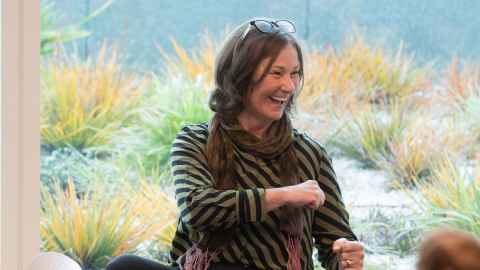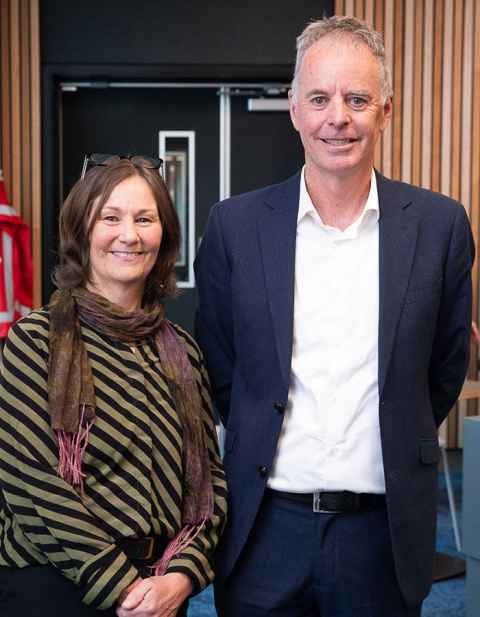The write stuff: Rebecca Jesson's inaugural lecture
30 October 2025
Literacy expert Professor Rebecca Jesson looks back on some of the many useful things she's learned in a career devoted to changing education for the better.

As a young girl, Rebecca Jesson remembers a shopkeeper in her small Waikato town of Tuakau asking her if she was going to be “a teacher like your mother, or a Communist (she’s the daughter of journalist and politician Bruce Jesson) like your father,” referring to the unusual situation in the 1970s of a stay-at-home dad.
The newly minted professor of education at the University of Auckland gave her inaugural lecture on 8 October in front of family, friends and colleagues, laying out her career-long commitment to understanding what’s happening in classrooms, what might make it better and why the answer oftens lies in the local community.
Over the years, her work has taken her around the country, and the Pacific; to improve literacy outcomes in Tonga, the Solomons and the Cook Islands.
However, it all started much closer to home.
After attending Otahuhu Intermediate and Otahuhu College in South Auckland, Jesson trained as a teacher and began her career at Otahuhu Primary, her local school; walking to school alongside her students, and living and working in the same community.
“I was shaped very much by that sort of South Auckland upbringing, and being part of a peer group, some of whom were successful and some of whom were not, and the different lives that everybody lived.”
She later taught at Manurewa Central School, and Royal Oak Primary School, where she learned a lot about “catering for different people at different pathways in their journeys”.

Getting the literacy bug
From there she did her masters (at Auckland) and joined a research team, led by notable educator Professor Stuart McNaughton, on the West Coast of the South Island.
“Stuart and his team were doing a literacy project with some West Coast schools and as a result, I just got the bug and started studying again, this time for my PhD under Stuart and (Emeritus Professor) Judy Parr, and I’ve never looked back because it’s very exciting work.
“We were in a place where these schools were coming to us and saying, ‘help us create a positive change for our kids’, so we were all putting our minds together to make that happen, and that’s the coolest part of the research I do.”
Jesson refers to teaching as “layered”.
“There are the children and their families, the teachers, schools and districts, which all create complexity for unpicking what’s going on; we call it ‘nesting’.
While literacy education is her broad focus, writing, and how we teach and learn it, has become her particular passion.
In the Pacific, for example, she says her team’s job was very much about observing and charting what was going on in classrooms, and then talking through the results with the teachers themselves to find shared solutions; what she refers to as a “sense-making” approach.
In some cases, she says, the problem simply comes down to a lack of resources.
“For example, if’s there's only one rubber in the classroom [as there was in a school in the Pacific her team were working with] and the kids have to write a story and they're waiting for their turn to rub out their mistake, they’re not actually spending much time writing. That gets in the way of learning to write well.”
So it was all about “getting underneath what they were seeing, rather than making judgements about it”, she says.
“There was always a ‘why’, we just had to get to it.”

Lots of ways to be a good teacher
It’s also very important, Jesson discovered, not to judge other contexts through Western eyes, especially when you’re working in places where English is not the heritage language.
“That’s a huge mind shift for Western-trained people, when they think they know what good teaching looks like. Instead, we have to retrain our own thinking and realise we know what we think good teaching looks like in our country.”
What she always tried to avoid, she says, is the common practice of educators from other places “flying in, making judgements, and flying out,” often focusing on what’s wrong, rather looking for what’s already working and building on it.
Many of the ways of working the team introduced into the three Pacific countries in 2014, alongside local educators, were still in use when they did a follow up study to see what had been sustained a few years later, says Jesson.
“And we’re still working with the people in the Solomons, even though the official part of the project is over; in fact, we’re writing a book about it.”
Manaiakalani
Which leads neatly into another big success, the Manaiakalani Programme, a collaborative initiative among a group of New Zealand schools, introduced in 2014 to better engage students through digital learning tools like Chromebooks.
The teaching process was called ‘Learn, Create, Share’, says Jesson, and involved children learning something new, creating something with it digitally, then sharing what they’d created via blogs, discussions and peer feedback.
And the results were remarkable.
“But teachers needed to understand them better,” she says, “so we came up with a way of monitoring progress over time in reading, writing and maths. In writing, group of schools managed to get two years’ worth of gain in writing in a single year, for example.”
As well as piquing interest and engagement, the team found using digital tools also reduced downtime, allowing teachers to focus on high-value teaching, rather than administrative or behavioural tasks, she says.
It’s also very important, Jesson discovered, not to judge other contexts through Western eyes, especially when you’re working in places where English is not the heritage language.
It's a team sport
What she’s firmly come to believe as a university researcher, particularly in an education faculty, she says, is that academic researchers need to be actively helpful to the profession.
“And that’s what I try and do in my area of applied research. I think there’s an assumption that the university makes the knowledge and ‘tells it to teachers’, whereas the work I've done is all about learning from, and with, effective teachers to create improvement.
“Our role is to get incrementally better at what we do, rather than knowing it all, and to realise we’re not perfect!”
Media contact
Julianne Evans | Media adviser
M: 027 562 5868
E: julianne.evans@auckland.ac.nz